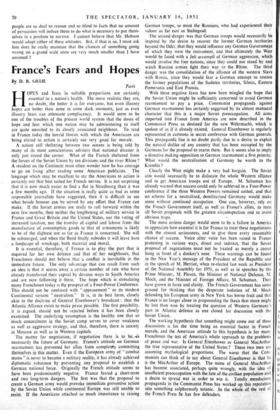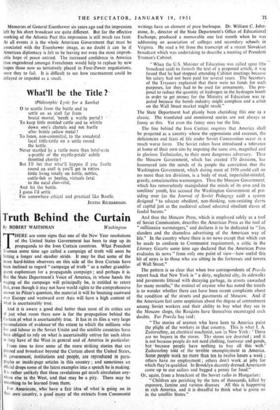France's Fears and Hopes
By D. R. GILLIE Paris
IOPES and fears in suitable proportions are certainly essential to a nation's health. The more realistic they are, no doubt, the better it is for everyone, but even illusory hopes are better than none in some dark moments, just as even illusory fears can attenuate complacency. It would seem to be one of the troubles of the present world system that the doses of hope and fear which one nation may be administering to itself are quite unsuited to its closely associated neighbour. To read in France today the horrid threats with which the Americans are being stirred to action is certainly not very good for morale.
A nation still sheltering between two oceans is being told by many of its most conscientious advisers that national disaster is only just round the corner. What of the French sheltered from the forces of the Soviet Union by ten divisions and the river Rhine ? A resident on the Continent must often wonder how he has courage to go on living after reading some American publicists. The language which may be excellent to stir the Americans to action is certainly not that best suited for French nerves. It is not surprising that it is now much easier to find a flat in Strasbourg than it was a few months ago. If the situation is really quite as bad as some responsible journalists have suggested, then it is difficult to see what beside honour can be served by any effort that France can make. If the Soviet armies are really to roll forward within the next few months, then neither the lengthening of military service in France and Great Britain and the United States, nor the voting of increased taxation, nor the transfer of capital and labour from the manufacture of consumption goods to that of armaments is likely to be of the slightest use as far as France is concerned. She will be submerged, and when the flood finally subsides it will leave bare a landscape of wreckage, both material and moral.
It is essential, therefore, if France is to play the part that is required for her own defence and that of her neighbours, that Frenchmen should not believe that a conflict is inevitable in the immediate future. The only advantage that can result from such an idea is that it scares away a certain number of rats who have already transferred their capital by devious ways to South America and are now following it there. The hope which is stimulating many Frenchmen today is thp prospect of a Four-Power Conference. This should not be confused with " appeasement " or its modern Continental version " neutralism." It is, in its best form, closely akin to the doctrine of General Eisenhower's broadcast : that the Atlantic Alliance exists to make peace possible. The first possibility, it is argued, should not be rejected before it has been closely examined. The underlying assumption is the healthy one that so much concealment in the Soviet camp serves to cover weakness as well as aggressive strategy, and that, therefore, there is anxiety in Moscow as well as in Western capitals.
The matter for negotiation, if negotiation there is to be, —is necessarily the future of Germany. France's attitude on German rearmament has prevented her allies from completely committing themselves in this matter. Even if the European army of " combat teams " is never to become a military reality, it has already achieved diplomatic substance by preventing any proposal to establish a German national force. Originally the French attitude seems to have been predominantly negative. France feared a short-term and two long-term dangers. The first was that the proposal to create a German army would provoke immediate preventive action by the Soviet Union while continental Europe was still unable to resist If the Americans attached so much importance to raising
German troops, so must the Russians, who had experienced their valour as far east as Stalingrad.
The second danger was that German troops would necessarily be inspired by the desire to recover the former German territories beyond the Oder, that they would influence any German Government of which they were the instrument, and that ultimately the West would be faced with a fait accompli of German aggression, which would involve the free nations, since they could not stand by and watch Russian armies fight their way to the Rhine. The third danger was the consolidation of the alliance of the western Slays with Russia, since they would fear a German attempt to restore the former populations of the Sudeten territories, Silesia, Eastern Pomerania and East Prussia.
With these negative fears has now been mingled the hope that the Soviet Union might be sufficiently concerned to avoid German rearmament to pay a price. Communist propaganda against German rearmament has certainly suggested by its almost maniacal character that this is a major Soviet preoccupation. All arms imported into France from America are now described in the Communist Press as destined for the new Wehrmacht, which is spoken of as if it already existed. General Eisenhower is regularly represented in cartoons in secret conference with German generals. This propaganda line is no doubt partly due to a desire to exploit the natural dislike of any country that has been occupied by the Germans for the proposal to rearm them. But it seems also to imply a directive making opposition to German rearmament a first priority. What would the neutralisation of Germany be worth to the Kremlin ?
Clearly the West might make a very bad bargain. The Soviet aim would necessarily be to dislocate the whole Western alliance and to get American troops out of Europe. M. Schuman has already warned that success could only be achieved in a Four-Power conference if the three Western Powers remained united, and that no scheme for a neutralised, demilitarised Germany would make sense without continued occupation. One can, however, rely on the French Government itself, as well as France's allies, to treat all Soviet proposals with the greatest circumspection and to avoid obvious traps.
The more serious danger would seem to be a failure in America to appreciate how essential it is for France to treat these negotiations with the utmost seriousness, and to give them every reasonable chance of success. Voice after voice has been raised in France protesting in various ways, direct and indirect, that the Soviet proposal of negotiations must not be treated as merely a carrot hung in front of a donkey's nose. These warnings can be found in the New Year's message of the President of the Republic and in the speech of M. Herriot, when re-elected last week as President of the National Assembly for 1951, as well as in speeches by the Prime Minister, M. Pleven, the Minister of National Defence, M. Moch, and the Minister of Foreign Affairs, M. Schuman. They have grown in force and clarity. The French Government has some ground for thinking that the desperate isolation of M. Moch defending his European army in New York has borne fruit and that France is no longer alone in propounding the thesis that more might be lost than won by treating the question of Western Germany's part in Atlantic defence as one closed for discussion with the Soviet Union.
The working hypothesis that something might come out of these discussions is for the time being an essential factor in French morale, and the American attitude to this hypothesis is for many Frenchmen the test of America's whole approach to the problems of peace and war. Is General Eisenhower or General MacArthur the true representative of the United States ? These two men are assuming mythological proportions. The worst that the Com- munists can think of to say about General Eisenhower is that he is the MacArthur of Europe. The name of General MacArthur has become associated, perhaps quite wrongly, with the idea of insufficient preoccupation with the fate of the civilian population and a desire to spread war in order to win it. Totally mendacious propaganda in the Communist Press has worked up this reputation into something sulphurously satanic. In the whole of the rest of the French Press Be has few defenders.
Memories of General Eisenhower six years ago and the impression left by his short broadcast are quite different. But for the effective working of the Atlantic Pact this impression is still much too faint. At all events it is the whole American Government that must be associated with the Eisenhower image, as no doubt it can be if American diplomacy is felt to be leaving not even the most improb- able hope of peace untried. The increased confidence in America thus engendered amongst Frenchmen would help to replace by new hopes those now so tentatively placed in Four-Power negotiations, were they to fail. It is difficult to see how rearmament could be delayed or impeded as a result.



































 Previous page
Previous page